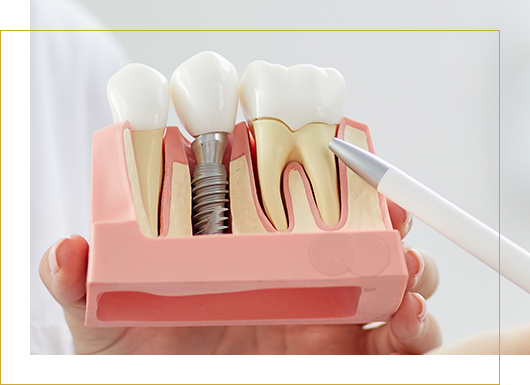Single Tooth Implants in Mundaring
A missing tooth can be embarrassing and can make it difficult to eat or flash your beautiful smile. Single tooth implants from Mundaring Dental & Implant Center can help restore your self-confidence.


Get Your Confidence Back with a Natural-looking Single Tooth Implant
Losing a natural tooth is incredibly frustrating. Not only does it affect your appearance, but it can also make it difficult to eat and speak properly.
It’s only natural to want to replace it as soon as possible. The good news is that there are several dental restoration options available these days.
Single tooth implants at Mundaring Dental and Implant Centre are the ideal option for those looking for a permanent replacement for one lost natural tooth. With the latest in dental technology and our more than capable dentist, the natural look and feel of your dental implant may make you forget you ever lost a tooth. Reclaim your confidence and flash your brightest smile. Book an appointment with us by calling 08 6495 2000 today!
Reasons Why You Would Need Single Tooth Implant
Address missing teeth. They can replace worn out and missing teeth and look natural. You can smile easily without feeling selfconscious
Implants save you from loose dentures. Over time, well-fitted dentures can deform and feel loose. Avoid the inconvenience of using denture adhesive and opt for a tooth implant.
Prevent Bone Loss. By directly the biting forces toward your jaw bone, implants avoid a common problem with traditional dentures – jaw bone reabsorption.


Why choose
Mundaring dental
& implant centre

Convenient Quality Dental Care
With over 50 years of combined experience, our team of professionals continues to provide high-quality dental services, from general dentistry and dental implant services to restorative and cosmetic dentistry.

A Compassionate Team Utilizing Modern Technology:
Mundaring Dental & Implant Centre offers the latest dental implant technology and techniques to provide you with the best possible results. Our state-of-the-art equipment makes your dental implant experience as easy and stress-free as possible.

Easily Accessible
Mundaring Dental & Implant Centre is proud to offer flexible payment plan options to make sure that everyone receives the dental care they need.

Same-day Dentistry and Fast Turn Around Time
Mundaring Dental & Implant Centre offers same-day service for various dental treatments, including dental crowns. You can get high-quality dental care and more natural-looking crowns in just one visit!
FAQs
Who is a good candidate for single tooth implants?
With the rising popularity of dental implants, it is important to determine whether it is the right treatment for you. Several factors determine whether you are a candidate for single tooth implants:
Bone Density
- A certain amount of bone must be present for the implant post to fuse properly. We can evaluate your bone quantity and density using modern 3D imaging technology, which gives us an accurate picture of your mouth and jaw bone. If you have sufficient bone density, we will proceed with your personalised implant treatment plan.
- There may not be sufficient bone to place dental implants if you have been missing a tooth for a while because gapped teeth cause subsequent bone loss in the area. In these cases, a bone graft procedure can be performed to prepare the implant site. It promotes tissue and bone growth.
Age
- An adult who is no longer growing and developing is the ideal candidate for dental implants. This ensures that the facial bones have fully developed and are strong enough to handle the stress of the implant procedure. Younger patients may need to wait until their facial bones have matured during the late teenage years.
Dental Health
- In order to undergo dental implant surgery, you must be in good general and oral health. Some conditions, like diabetes, heavy smoking, and gum disease, can prevent the success of dental implants. To provide you with the best dental care, our compassionate dentists will evaluate your individual needs, and if necessary, we will consult with your physician.
How does a single implant work?
Single dental implants have three main components:
- Implant. A titanium implant is a screw-shaped post positioned into the jaw bone. During installation, the implant post is inserted into the jaw through the gum. In the process of osseointegration, the implant integrates or fuses with the bone. The gums heal around the area, covering most of the implant.
- Abutment. This component is usually constructed from gold, titanium, or porcelain. It connects the crown to the small portion of the implant that is visible above the gumline.
- Dental Crown. An implant’s visible portion is its porcelain crown. It is custom-made to match your other teeth, and it is attached to the abutment.
Why is it important to replace a missing tooth?
Missing teeth at the front of your mouth can impact your self-esteem as well as affect your speech. Additionally, losing individual teeth at the back of the mouth can result in difficulty chewing food. This can have long-term negative effects on the remaining teeth. They must increase their load in order to compensate for the lost tooth, causing excessive wear or fracture. Neighbouring teeth can move or drift to fill the gap. The movement creates continuous food and plaque traps, which could lead to decay and gum disease.
What are alternatives to single tooth implants?
Your dentist may suggest these alternative treatment options if a single dental implant is found not to be ideal for your case:
Dental Bridge. A dental bridge fills in the gap left by a missing tooth by anchoring a crown to the adjacent teeth. The main requirement for this procedure is that the teeth on either side of the gap must be strong enough to support it. It is also a less bulky alternative to dentures.
Removable Partial Denture. In the event that the bone density or health of the patient does not make dental implants viable options or the adjacent teeth are too weak to support a dental bridge, removable partial dentures may be suggested as an alternative. They are ideal for those who have lost a couple of teeth along different sites of the dental arch and are the least invasive option to fill a tooth gap.
What happens during the single tooth implant procedure?
Initial Consultation: Planning and Assessment
An initial oral examination by the dental surgeon may be necessary to evaluate whether a dental implant is suitable for the patient. Dental imaging studies like X-rays, panoramic films, and/or CT scans may be used during the evaluation. At this stage, the jaw bone is evaluated for its quality and quantity to determine if more bone is required at the site.
When it is determined that a dental implant can be placed in the desired location, the first oral surgery is scheduled in order to prepare the site for the implant. Patients typically receive local anesthesia to numb the surgical area as well as any sedatives needed for comfort and anxiety reduction during all subsequent surgical procedure appointments.
First Oral Surgery: Site Preparation
The first oral surgery often involves tooth extraction. It is not uncommon for an implant site to have existing defective teeth that need to be addressed. After the extraction, if needed, a natural or synthetic bone is used to establish a solid foundation for the implant. This is called an alveolar bone graft and has an estimated healing period of between two and six months.
If there is no tooth at the site and bone loss is present, an onlay bone graft procedure is done by placing a bone graft on top of the existing jaw bone. An extended healing period of about six months is usually required for this procedure. Occasionally, if enough bone is present, it is possible to extract the damaged tooth and place the implant at the same time. We call this immediate implant placement.
Second Oral Surgery: Implant installation
The site is ready for the implant once the strong, adequate bone is present following the bone graft procedure. During the implant installation surgery, the screw-shaped titanium implant posts are embedded into the stable bone base. At this point, the gums are stitched up, and healing begins.
A temporary denture can be made to replace missing teeth during this healing phase to improve aesthetics. As the implant integrates into the bone, it may require a period of time to heal. Recovery time depend entirely on the quality of the bone. This can range from anywhere between two and six months.
Generally, implants placed on the lower jaw integrate more quickly with the bone than those on the upper jaw. This is partly due to the greater bone density found in the lower jaw that allows for faster fusion.
Implant Completion: Crown & Abutment Attachment
Once the healing period is complete, the dental implant is tested to determine whether the bone has taken it up. An abutment is attached to the secure dental implant using a screw. In order to make a custom-fit implant crown, the dentist will take an impression or mould of the abutment in the mouth. After the crown is made, it is now ready to be secured on the abutment.
What can you expect after the dental procedure?
Post-surgical discomfort will vary depending on the individual case after the local anaesthetic wears off. Generally, most people find the post-operative experience to be similar to that of a tooth extraction. Immediately after surgery, a cold ice pack is placed on the skin over the surgical area to reduce swelling. Over-the-counter medications are often used to manage pain. The recovery time and prescription pain medication may be longer following invasive or complicated surgery. The area may need to be treated with antibiotics and oral rinses in addition to pain medications for a few weeks following the procedure.
Possible Risks of Tooth Implants
Any type of surgery carries with it certain risks and complications that could be harmful to the patient or to a successful dental implant. A careful review of bleeding disorders, infections, allergies, medical conditions, and medications is required before undergoing oral surgery. Generally, success rates are quite high. The occasional implant failure can be caused by:
- Infection
- Dental implant fractures
- Dental implant overloading
- Faulty implant positioning
- Poor bone quantity or quality
- Excessive trauma to the surrounding tissue
Peri-implantitis is a serious condition that may occur following implant surgery. It is characterised by inflammation of the gum and bone surrounding the implant. Infections or excessive biting forces on the implant are usually the causes of the inflammation of the surrounding tissues. If left untreated, peri-implantitis can lead to implant loss. In order to avoid this outcome, it is essential to maintain good oral hygiene through proper brushing and flossing to remove food particles and plaque. Conventional treatments involve the removal of the calcified deposits around the dental implant using specialised tools.
Tips to Avoid Implant Complications:
- Rinse your mouth frequently.
- When you don’t have access to your toothbrush, bacteria remain in your mouth. By rinsing with water frequently, you can help neutralize it and remove trapped food particles. You can also prevent the growth of bacteria by keeping your mouth moist.
- Take care of your oral health.
- In order to protect your dental implants, you must take measures at home to prevent infections. A good way to keep your teeth healthy is to brush twice a day and floss before you go to bed. You should be careful when cleaning your implants and abutments to remove trapped debris. Cleaning hard-to-reach areas may be easier with a water flosser.
- Make sure you see your dentist twice a year.
- In spite of the fact that dental implants don’t decay, you should still visit your dentist twice a year for a cleaning and checkup. By monitoring your oral health, your implant dentist can intervene quickly at the first sign of an infection, like swelling or redness of the gums.
- Eat and drink less sugary foods.
- In addition to causing tooth decay, sugar encourages bacteria growth. If you can’t ignore your sweet tooth, rinse your mouth with water afterward until you can get to your toothbrush.
- Avoid smoking or using tobacco.
- In addition to contributing to implant failure, smoking impairs the body’s ability to heal and fight infections. When it comes to smoking, it’s better to quit completely. But if you can’t, wait at least 2 months after your placement surgery before starting again.
